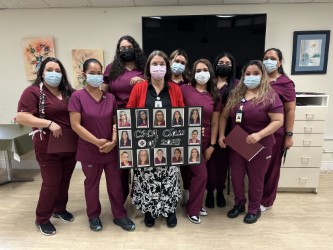Aphasia
- Category: Health & Wellness, Rehab
- Posted On:
- Written By: LVMC

Aphasia is a condition that impairs your ability to write and verbally communicate. Without treatment, aphasia can reduce the quality of life and make it difficult for you to interact with others, including your loved ones.
Continue reading to learn more about aphasia and about how to contact Lompoc Valley Medical Center if you or a loved one needs treatment for this serious medical condition.
What Causes Aphasia?
Aphasia usually occurs after you’ve suffered a head injury or stroke—both of which can rupture or block blood vessels in the brain to damage parts of the brain that control language. This type of brain damage can affect your ability to write, speak, and understand language.
Aphasia can also gradually develop from a slowly progressing brain disease, infection, or tumor, in which case it may be accompanied by confusion and other cognitive problems. This type of aphasia is known as primary progressive aphasia, which may eventually develop into dementia.
What Are Symptoms Of Aphasia?
All symptoms of aphasia are related to difficulties with communication. If your loved one has symptoms of aphasia, they may likely have suffered a stroke or have a brain tumor.
Aphasia symptoms may include:
- Saying things that don’t make sense
- Difficulty reading and spelling
- Saying sentences that are short or incomplete, or that eliminate the words “the” and “and”
- Saying long, confusing sentences that contain made-up or unnecessary words
- Saying unrecognizable words
- Switching up or confusing words and sounds with others
- Saying words in the wrong order
- Having difficulty understanding and following conversation
- Writing words and sentences that don’t make sense
- Trouble naming objects, places, events, or people even though they are known to the person (“tip of the tongue” phenomenon)
- Difficulty with using numbers or doing math
How Is Aphasia Diagnosed?
Your doctor may diagnose aphasia by performing a series of physical and neurological tests that examine your heart, muscle strength, reflexes, and blood vessels in the neck. Imaging tests, including magnetic resonance imaging (MRI), computed tomography (CT), and positron emission tomography (PET), may also be used to identify what may be causing your symptoms.
Given how aphasia affects communication, you may also undergo a series of tests that evaluate your communication and language skills. These tests may take place with a speech-language pathologist and involve:
- Reading and writing
- Naming common objects, such as a ball, toothbrush, or apple
- Engaging in a conversation
- Understanding and using words correctly
- Following directions
- Repeating words, phrases, and sentences
- Forming certain sounds and letters
- Answering questions about things you hear or read
- Answering yes or no questions
- Responding to open-ended questions
What Are Treatments For Aphasia?
Your treatment for aphasia will depend mainly on the severity of your condition, though the primary treatment is speech and language therapy. This therapy helps you relearn how to communicate and use words and language correctly. Your doctor may also involve your family in the treatment process, as your family may know how to best communicate with you.
People with mild aphasia and brain damage may recover their language and communication skills without extensive treatment. However, many doctors recommend some level of treatment to accelerate the rebuilding and relearning of these essential skills.
Speech and language therapy for aphasia is often most effective when it takes place immediately following diagnosis. Therapy usually occurs in group settings where you can practice and test your communication skills with others in a safe, therapeutic, non-judgmental setting. You may also be allowed to use computer programs that help you relearn vocabulary and sound out certain words.
Other potential treatments for aphasia include magnetic brain stimulation therapy and medications that improve blood flow to the brain. However, these treatments are not yet officially approved to treat aphasia and require additional research and testing before being used across most medical settings.
Can Aphasia Be Prevented?
Aphasia occurs on behalf of brain disease and injury and cannot necessarily be prevented if you suffer from one of these brain conditions. The only way to prevent aphasia is to reduce your risk of medical conditions that may cause aphasia. For example, if you meet risk factors for stroke such as smoking and obesity, you can work with your doctor to stop smoking and develop a nutrition and exercise plan that helps you lose excess weight.
Aphasia Treatment at Lompoc Valley Medical Center
Lompoc Valley Medical Care offers a wide range of healthcare services, including imaging services and speech therapy that can diagnose and treat your loved one for aphasia. Visit our provider page today to make an appointment and learn more about our many available healthcare services for you and your family.






